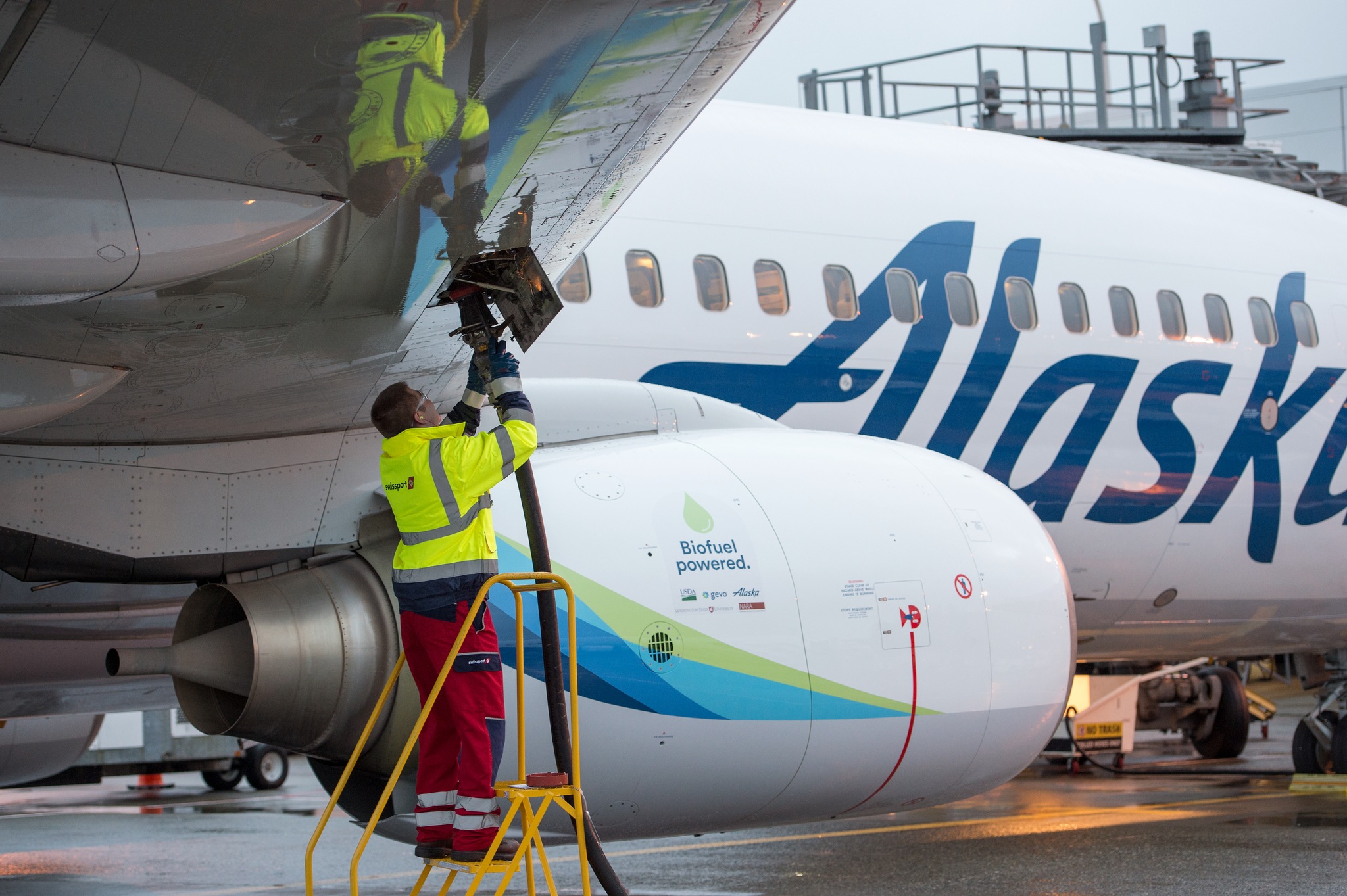The press conference on aviation biofuel held in downtown Seattle on January 12 was not some showy, pie-in-the-sky, wouldn’t-that-be-nice kind of event. Nope: The effort to get every single plane that flies out of Sea-Tac to run on biofuel is quite real. It’s so real that we’re already talking about delivery pipelines (the Olympic Pipeline that currently moves jet fuel from the Anacortes refineries to the airport could work) and blending facilities (the Sea-Tac Airport Fuel Farm will do, in the short term; a Philips66/Olympic Pipeline Company site in Renton could work for larger biofuel volumes later on). It’s already down to brass tacks.
A feasibility study presented by the Port of Seattle, Alaska Airlines, and Boeing at the January 12 press conference was the latest iteration of a multiyear process to think seriously about how Seattle could help turn a nascent industry with a handful of biofuel test flights into a reliable, sustainable, market-driven thing.
“In the Pacific Northwest, we understand that climate change is real, that global warming is not a ‘hoax,’ ” Port of Seattle Commissioner John Creighton told the nodding attendees, with particular emphasis. (For what it’s worth, the decision to host the Shell drilling rig in 2015 is something Commissioner Creighton has said haunts him; “My values were with the protesters,” he told Crosscut). “Taking action at the local level that reflects our community’s values and interests is all that much more important in our current national political environment.”
The Port’s goal is to “ultimately power every flight out of Sea-Tac Airport with sustainable aviation biofuel,” he added, but “there are lots of pieces to this puzzle. ”
For the uninitiated, it is quite surprising. Not only is it possible to meet this goal—there have been, over the past five or six years, some 2,500 biofuel test flights around the world, with commercial airplanes successfully traveling thousands of miles on everything from algae to used cooking oil to industrial oilseed crops—but it is beginning to look probable. And Sea-Tac may be among the few airports in the world with this much skin in the game. Research on the topic has been going on for some years now in Washington; the Sustainable Aviation Fuels Northwest report, for instance, published in 2011, was the first regional assessment of its kind in the U.S. So far the only airport in the country that uses any biofuel in its regular operations is LAX, where United Airlines has a three-year contract with a company called AltAir Fuels to use a small percentage of biofuel in its Los Angeles flights. (AltAir is now based in California, but was founded in Seattle).
However, besides that contract, “there is not a commercial supply of aviation biofuel in the country,” said Carol Sim, environmental-affairs director at Alaska Airlines. “We can’t just go buy fuel.” Part of the intent of this study, she said, was “to send a market signal to potential fuel producers” that there is a demand, and it’s in Seattle. “We do have a 2020 goal to bring a commercial supply of biofuel to one of our airports. We want that to be Sea-Tac.”
When people hear “biofuel,” they often think of corn-derived ethanol, a fuel that has been determined to be utterly useless in terms of mitigating climate change, and pretty environmentally harmful all around. But bio-derived fuels have come a long way in a few short years, and aviation biofuel—usually still blended with traditional jet fuel, but designed to be dropped right in to airplanes without any modification whatsoever—is getting better. Early research suggests that this kind of fuel not only releases fewer carbon emissions, but fewer particulate emissions, too. There is still not enough of it, though.
“It’s basic economics; there is not enough fuel right now, and the price point is high,” says Ellie Wood, Boeing’s regional director of environmental strategy. She points out that by far the largest operating cost for any airline is the price of fuel—nearly 30 percent, on average. So there’s little cause for any commercial airline to opt for something more expensive than what they already buy. That’s why the Port, Alaska, and Boeing are taking an “‘if we build it, they will come’ approach,” she says; if fuel producers see Seattle’s interest, and more fuel can be produced, then the fuel gets cheaper. Once there’s more demand, “investors… [start] realizing that this is not just a phenomenon. We’ve reached a tipping point.”
Boeing, Wood says, has been on the biofuel beat for a while. After joining an aviation-industry goal in 2008 to cut net aviation CO2 emissions in half based on 2005 levels by 2050, the company helped get the first bio-derived fuel to be approved by an international standards body for commercial flight in 2011. It also helps fund biofuel research projects all over the world—such as one on fuel made from tobacco plants in South Africa, or another on waste cooking oil scraped from gutters in China. And right now, it’s working to get a waste-vegetable-oil and animal-fat-based fuel that’s used only in ground transportation so far—Green Diesel—certified for use in aviation too.“We’re in this for the long haul,” she says.
Of course, the economic picture is still a bit murky. Next up: a study on long-term financing for the switch to biofuel at Sea-Tac, which the Port expects to be released in the spring. But for those looking to the Pacific Northwest to keep toeing the line on carbon reduction, despite the federal landscape, here’s the good news: What’s happening here is being championed by local elected officials and private companies. It doesn’t seem as if Seattle needs the federal government on this. While the financial study will identify “all possible options for funding aviation biofuels and infrastructure, including federal funding,” says Susan Stoltzfus, a communcations manager at the Port, “nothing is contingent on federal funding.”
sbernard@seattleweekly.com









